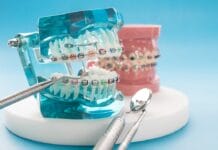If you’ve been in the dental hygiene profession for at least a few years, I’m willing to bet that you’re starting to feel some aches and pains. They may not be debilitating, but they’re there. All of those seemingly small, poor posture choices (craning your neck to see while your hands are occupied with the ultrasonic and suction – tips anyone? Please, I’m desperate) we make throughout the day add up to be a much bigger issue.
Whether or not you’re at that point yet, planning for back and neck pain is simply wise. Chances are these problems will find you someday in your career. We face a unique range of risks, from musculoskeletal disorders to harmful substance exposure. Work-related factors aside, a skiing tumble, a car wreck, or a freak accident could immediately place you in a moment of crisis where you can no longer use your hands or have the ability to treat patients like you need to as a dental hygienist.
Disability insurance is becoming more popular amongst hygienists for these reasons. While this option may not be possible for everyone, it is crucial to consider it carefully and understand how it can help should something happen that prevents you from doing your job. Below is a brief overview of four things to know about disability insurance.
1) Income protection
I would imagine that the number one reason any hygienist would consider disability insurance is to protect their income. The unfortunate truth is that hygienists are somewhat pigeonholed in their careers, meaning that our specific skills are not easily transferrable to another profession, or at least not a profession that would provide the same income level.
To maintain the ability to pay your rent or mortgage, buy groceries, take care of dependents, and continue to just “live life,” having an income flow that can keep you stable is extremely important. However, it should be noted that disability insurance isn’t designed to replace 100% of your current gross salary. Benefits typically replace about 60% of it.1
2) The three types of disability insurance
Dental hygienists are able to access three different types of disability insurance, including:1
- Short-term
- Long-term
- Accident-only
Short-term disability insurance is, as you would imagine, something that would handle disability for a short time. An example is if you are a skier and injure yourself on the slopes, breaking your dominant hand. Or, you need carpal tunnel surgery because of years of wear and tear to your wrist as a hygienist.1
These are considered disabilities and can take weeks to heal enough to return to work. If you have disability insurance, you’ll be eligible for some benefits once you have met the waiting period.1
Alternately, long-term disability insurance is the most needed option since it can provide income after a more serious disability where work may never be possible again. Any disability that lasts longer than three months is typically under this umbrella. Events like cancer, a stroke, more involved accidents, or a diagnosis of a debilitating disease, such as ALS, would qualify you.1
The final option is accident-only disability insurance. This is more of a “last resort” choice because it only pays a benefit when there’s an actual accident or incident, as opposed to a disability forming over the long term, such as musculoskeletal disorders. Usually, in this case, there are no health questions, and it can be fairly straightforward.1
3) Can I afford it?
Depending on the type of premium you purchase, monthly costs usually range from $100 to $180.1 If this feels like a lot, I like to remember how often I “treat myself” to a coffee and how painfully much those cups of joy are starting to cost. Is coffee more important than insuring your future?
Depending on certain factors, the premium will become more expensive. The main factors insurance companies consider are:1
- Your age
- Occupation
- Health conditions
- Income insured
To qualify for something such as long-term disability insurance, you will typically be asked a series of health questions, and the insurance company will need to access your health records.1
4) Potential barriers and frustrations
One reason I wanted to write this article was to remind myself how important disability insurance is. I had previously attempted to purchase it and was met with some difficulty, which took some of my motivation away. I found that the world of disability insurance is not as up-to-date with accepting the need for modern “preventive” care.
What I mean by that is that I have a history of chiropractic treatment and taking antidepressants, both done as ways of building a healthier life and focusing on prevention. The disability insurance company I was attempting to sign on with denied me due to having these factors in my history.
I remember feeling incredulous at this fact, and I also recall the agent working with me apologizing profusely for how “behind the times” those who make these regulations are.
I share this story not to inhibit you from moving forward with disability insurance but to warn you about what you might come up against. I want to encourage you to continue trying and looking into other companies if you come across this same issue.
In Closing
Whether or not you’re a new graduate or a seasoned hygienist, make 2024 your year to think of your career goals and protect your future self with disability insurance. Don’t just expect the unexpected, but actually plan for it. Connect with an insurance advisor, consider your options, look at your budget, and remember – it’s more important than coffee (but just slightly)!
Before you leave, check out the Today’s RDH self-study CE courses. All courses are peer-reviewed and non-sponsored to focus solely on high-quality education. Click here now.
Listen to the Today’s RDH Dental Hygiene Podcast Below:
Reference
- Barnes, J. (2024, April 12). Disability Insurance Guide for Dental Hygienists and Dental Assistants. My Family Life Insurance. https://myfamilylifeinsurance.com/2017/10/27/best-disability-insurance-dental-hygienists-dental-assistants/










